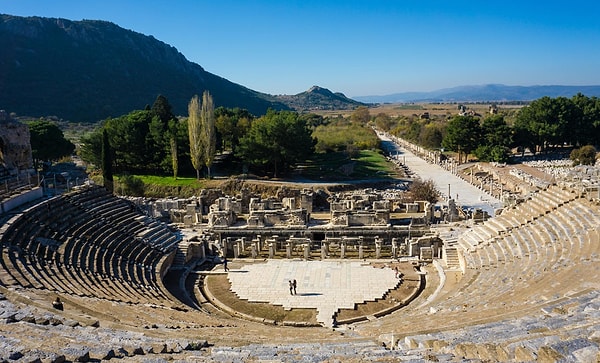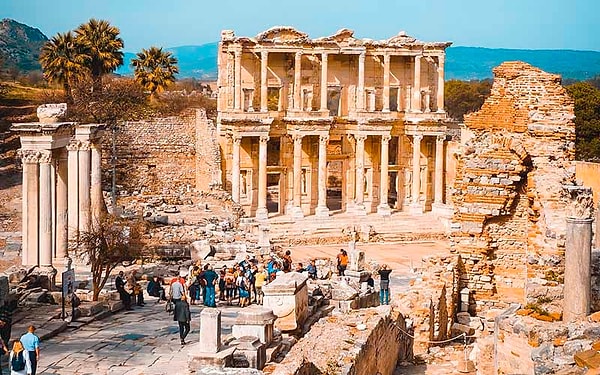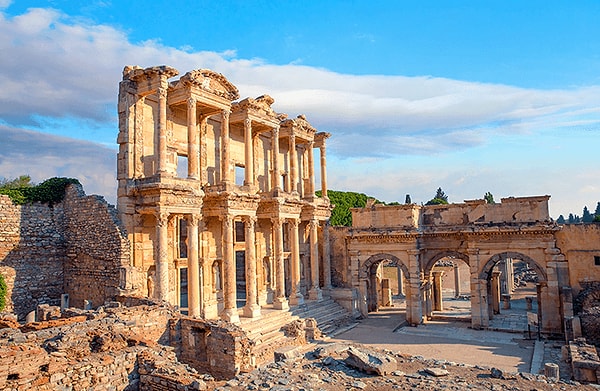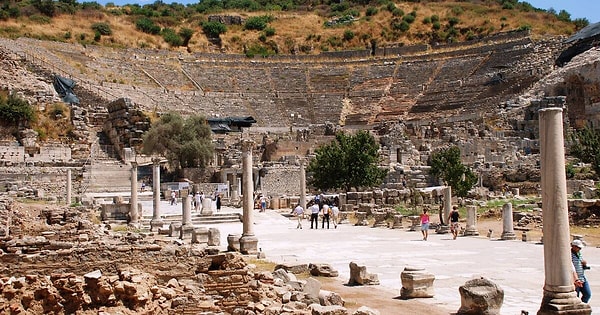The Rich History of Ephesus: The Secrets of Turkey's Ancient City
Ephesus, located in western Turkey, is one of the most fascinating and historically significant cities in the world. It was once one of the largest cities in the Roman Empire, and today it stands as a testament to the ingenuity, creativity, and determination of ancient civilizations. In this blog post, we will delve into the rich history of Ephesus, uncovering the secrets of this ancient city, and exploring its incredible architecture, artwork, and cultural significance.
1. The Origins of Ephesus

The history of Ephesus dates back to the 10th century BC, and the city was initially founded by the Greeks. The city was strategically located on the Aegean coast and was a significant commercial center. The city's port provided access to the Mediterranean, and its location made it a gateway to the east. Ephesus became a bustling center of trade and commerce, and it attracted people from all over the world.
Over the centuries, Ephesus was conquered by various empires and civilizations, including the Lydians, Persians, and Macedonians. In 133 BC, the city was incorporated into the Roman Empire, and it experienced a period of growth and prosperity.
2. The Golden Age of Ephesus

During the Roman period, Ephesus experienced a golden age of prosperity and growth. The city became one of the largest and most important in the Roman Empire, and it was renowned for its incredible architecture, artwork, and culture. The city's prosperity was due in part to its location, which made it a hub for trade and commerce.
Ephesus was home to a vast array of public buildings, including temples, markets, theaters, and bathhouses. These buildings were constructed using the finest materials, and they were decorated with elaborate mosaics, frescoes, and sculptures. The city was also home to a bustling port, which provided access to goods and materials from all over the world.
3. The Architecture of Ephesus

Ephesus is home to some of the most impressive ancient architecture in the world. Its most famous landmark is the Library of Celsus, a stunning structure that was built in the 2nd century AD and served as a repository for over 12,000 scrolls. The library was destroyed by an earthquake in the 3rd century, but its facade was reconstructed in the 1970s.
Other notable structures in Ephesus include the Temple of Artemis, one of the Seven Wonders of the Ancient World. The temple was built in the 6th century BC and was considered to be one of the most important religious sites in the ancient world. Unfortunately, little of the original temple remains today, but its
ruins are still an impressive sight.
The Great Theatre in Ephesus is also worth mentioning. It could seat up to 25,000 people and was used for a variety of events, including theater performances and gladiatorial games.
4. The Artwork of Ephesus

Ephesus is also home to some of the most incredible artwork of the ancient world. The city is known for its stunning mosaics, frescoes, and sculptures, which can be seen in various temples, villas, and public spaces throughout the city.
One of the most impressive examples of Ephesian artwork is the House of the Virgin Mary, a small house on the outskirts of the city that is believed to have been the home of the Virgin Mary. The house is decorated with beautiful frescoes and mosaics that date back to the 4th century.
Another noteworthy example of Ephesian artwork is the Terrace Houses, a series of villas that were built in the 1st century AD. The houses are decorated with stunning mosaics and frescoes that depict scenes from daily life.
5. The Cultural and Religious Significance

One of the most significant religious sites in Ephesus was the Temple of Artemis, which was considered to be one of the Seven Wonders of the Ancient World. The temple was dedicated to the Greek goddess Artemis, who was associated with fertility, childbirth, and the hunt. People from all over the ancient world would come to the temple to worship and offer sacrifices.
Another important religious site in Ephesus was the House of the Virgin Mary, which is believed to be the home of the Virgin Mary. The house is a place of pilgrimage for Christians, and it is believed to have been visited by St. John and other apostles.
Ephesus was also home to a vibrant cultural scene. The city was renowned for its theater performances, and the Great Theatre in Ephesus was one of the largest and most impressive in the ancient world. The theater was used for a variety of events, including theatrical performances, gladiatorial games, and religious ceremonies.
6. The Decline of Ephesus

Despite its golden age of prosperity, Ephesus began to decline in the 3rd century AD. The city was hit by a series of devastating earthquakes, and its harbor began to silt up, making it more difficult for ships to access the city. The city's population declined, and many of its buildings fell into disrepair.
Ephesus continued to decline over the centuries, and it was eventually abandoned in the 15th century. The city lay in ruins for centuries, and it was not until the 19th century that excavation and restoration work began.
Today, Ephesus is a popular tourist destination, and it attracts visitors from all
over the world who come to marvel at its incredible architecture, artwork, and
cultural significance. The city is a testament to the ingenuity, creativity, and determination of ancient civilizations, and it remains a source of inspiration and fascination for people of all ages and backgrounds.
Did you know these about the Ephesus? Let's meet in the comments!
Keşfet ile ziyaret ettiğin tüm kategorileri tek akışta gör!


Send Comment